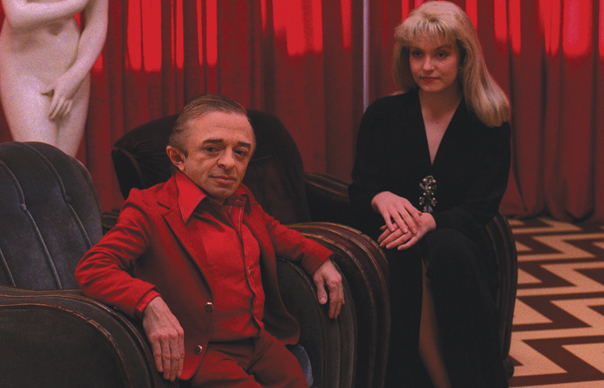Lynch had spent time in Washington State, where Twin Peaks was set. “Things seep in and get reinterpreted somewhere,” he says. “I know that area but I wasn’t thinking directly about it. Twin Peaks became its own area.”
Frost, meanwhile, drew on a ghost story his grandmother told him, a local legend from upstate New York where the body of a young girl is found by the lakeside.
“It haunted me for years, that story,” Frost says of the event which inspired the fate of Twin Peaks’ homecoming queen, Laura Palmer. The impact of the murder on a small town might, they decided, be something that could be sustained over the course of a full season of network television. Not a standard soap or whodunnit, but a sort of macabre, paranormal updating of Peyton Place.
“I don’t like getting stuck into someone’s definition of what you can or can’t do with a story,” says Frost. “Narrative is my primary interest – that was the alchemy of our partnership. David brought the bewitching quality to the look and feel and sound of the show, and together we tried to create a persuasive and complex universe. We didn’t think this was going to get picked up, certainly not by a network. It was the end of the Reagan era in America. Cable had not taken root. HBO was in its infancy as far as original programming. We were really out on a limb.”
Amazingly, ABC commissioned a pilot in 1988, but Lynch and Frost were careful to shoot it as a possible theatrical release, expecting the putative series would be rejected by the network. The production in Bellevue, Washington was fronted by Dune and Blue Velvet star Kyle MacLachlan as Special Agent Dale Cooper, while another Lynch regular, Eraserhead’s Jack Nance, uttered the show’s now immortal first line, “She’s dead… wrapped in plastic.” Experienced character actors like Ray Wise and Grace Zabriskie (as Laura’s parents) were teamed up with a host of hot young talent: Lara Flynn Boyle, Madchen Amick, Sherilyn Fenn and Sheryl Lee as Laura herself. Lynch was so enamoured with Lee she was revived in flashbacks, dream sequences and in the guise of a lookalike (but brunette) cousin, Maddy. “Sheryl was gonna be a dead girl on the beach,” he says, “But there’s a quality to her that’s just like an explosion. She just married to Laura Palmer – that face, those eyes, that smile, it was incredible.”
A crucial part of Lynch’s vision was that Twin Peaks, for all its absurdities, should be played with no hint of irony. Even the Log Lady kept a straight face. When Leland Palmer (Wise) throws himself onto Laura’s casket at her funeral, the melodrama was extreme, but far from camp. “I’d seen things like that happen at funerals,” explains Ray Wise. “It seemed very real, not at all outrageous or untoward, but a natural outgrowth of what he was feeling. That’s how I felt about all the unusual things Leland did in some of the scenes, like dancing.”
“David pushed me, over and over, to something that I might have to describe as ‘Hyper Straight and Sincere’,” says Grace Zabriskie. “That’s why some people cry at that scene, some people laugh, some crying people get angry at the people who are laughing, and some people laugh and cry at the same time.”
“One of the great moments is the long slow pan down the phone cord when Grace is wailing in the background [after she learns of Laura’s death],” remembers Kyle MacLachlan. “You run the gamut from, ‘Oh my God, this a horrible thing,’ to ‘Wait a minute, this is kind of comic.’ David plays with emotions that way. Ultimately he gets a kick out of it. You’re not sure where you’re supposed to go with it.”
“It wasn’t even a choice to play it less than straight,” Lynch insists. “To me you wanna make a world that’s real. You don’t want to break that.”
The director’s attention to detail was meticulous. He hired Angelo Badalamenti – another Blue Velvet veteran – to provide the score, and lovingly recreated an Edward Hopper-indebted diner culture which immediately charmed preview audiences in the US. At the heart of the action, he placed MacLachlan as Dale Cooper, sent to investigate Palmer’s murder. A stranger in a strange land, rhapsodising about the towering Douglas Fir trees and the quality black coffee from the first minute he rolls onto the case.
“That kind of boyishness was right there from the beginning,” says MacLachlan. “I borrowed from David. He has that same enthusiasm for aspects of the world that some others might just walk past. Cooper’s a grounding for an audience. I felt that way with Jeffrey Beaumont in Blue Velvet, that I was the eyes and ears of the audience in this highly unusual environment.”
“Cooper is unique,” Lynch says, “and it just kind of flowered out. He’s that way and people understand that. That’s what’s great. They’re with him, from the first time you see him.”


